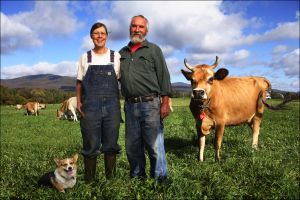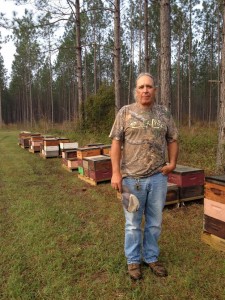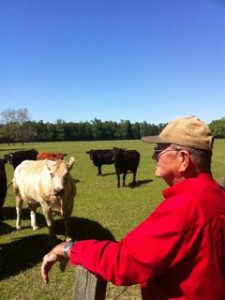June Newsletter 2014
 the first night of fireflies
the first night of fireflies
is something that I always wait and look for in my life, no matter where I am. Summer is finally here, the first cut of hay is off, and the vegetables are growing. The fireflies may have been the portal to my life with honey bees. As a child, I collected them with my brother and sister and brought them into our bedroom. They are fun and magical.
Last night the fireflies first appeared at our distillery and later on the farm. Lighting up the night, they flutter around when their season comes, turning on and off with their flight, much as a loon dives under the water and comes up in another place. They come and go with the temperature changes of the night.
There is a rhythm to the seasons that becomes part of your soul. Now the frogs are singing every night, choruses of little peeper frogs and larger tree frogs on the pond and in the marshy areas of the woods. As the temperature rises and falls through the night, the singing moves from one group of frogs to another, just as a conductor points to different members of an orchestra to play through a symphony.
Climbing Barr Hill in the summer is one of my favorite hikes. The juniper berries all over the summit recall the early days when we were hiking here and thought of making gin and finishing it with raw honey. Barr Hill is a thin place. Our ancestors in Scotland call a sacred place “thin”, where heaven and earth are very close and mingle together.
We always anticipate the moment in the summer when we know there will be a crop of honey. I call this “the turning point” – over 12 months of preparation have gone into this moment. The preparation for the next crop never stops; even when you are in the middle of one crop, you are always thinking ahead to the next. I recall one year in the St. Lawrence River Valley of Northern New York. Just as I was seeing 100 lbs. of new honey on hive after hive for the first time, an Amish horse and buggy drove by, with the horses’ hooves pounding on the dry road for a half mile before and after the bee yard. When the crop is on the bee hives, we breathe sighs of relief and gratitude.
This past weekend a swarm moved into some bee equipment on the farm. All the colonies in this bee yard had died this past winter, and that was tough. As I was too busy and bees were not available for purchase at this late date, it was time to surrender. I left a pile of bee equipment outside in hopes of attracting a swarm. When a neighbor came over to borrow bee equipment for her swarm, I noticed a lot of activity in this hive, and sure enough, a swarm of bees had come and made a home in this hive within the last two days. There were just a few eggs, and the next day I found the queen.
“A swarm in May is worth a load of hay
A swarm in June is worth a silver spoon.
A swarm in July is not worth a fly.”
Timing is everything in agriculture, and we are grateful to have the bees back on the farm. There will be squash and berries to pollinate this year, and apples next year.
These are the rhythms of the season in a place that we love, and it is an honor to move through each of the four seasons in the Northeast Kingdom of Vermont.
thank you for your interest in and support of our work with organic honey, grains, and elderberry,
Todd D. Hardie
CLICK HERE to view the complete June 2014 Newsletter

 every Spring. The Vermont guys were put together at a table, the young farmers, he with yogurt, me with honey. His inspiration to our work was as important as the Butterworks Farm yogurt, which is most always in our refrigerator at home. For years, Jack has encouraged countless farmers to have courage, innovate, develop value added products, and keep at it. He has been very important in NOFA and the Northern Grain Growers Association.
every Spring. The Vermont guys were put together at a table, the young farmers, he with yogurt, me with honey. His inspiration to our work was as important as the Butterworks Farm yogurt, which is most always in our refrigerator at home. For years, Jack has encouraged countless farmers to have courage, innovate, develop value added products, and keep at it. He has been very important in NOFA and the Northern Grain Growers Association. eens, 1 lb. of organic carrots and 1 lb. organic potatoes
eens, 1 lb. of organic carrots and 1 lb. organic potatoes


 Jim Huggins on his farm
Jim Huggins on his farm